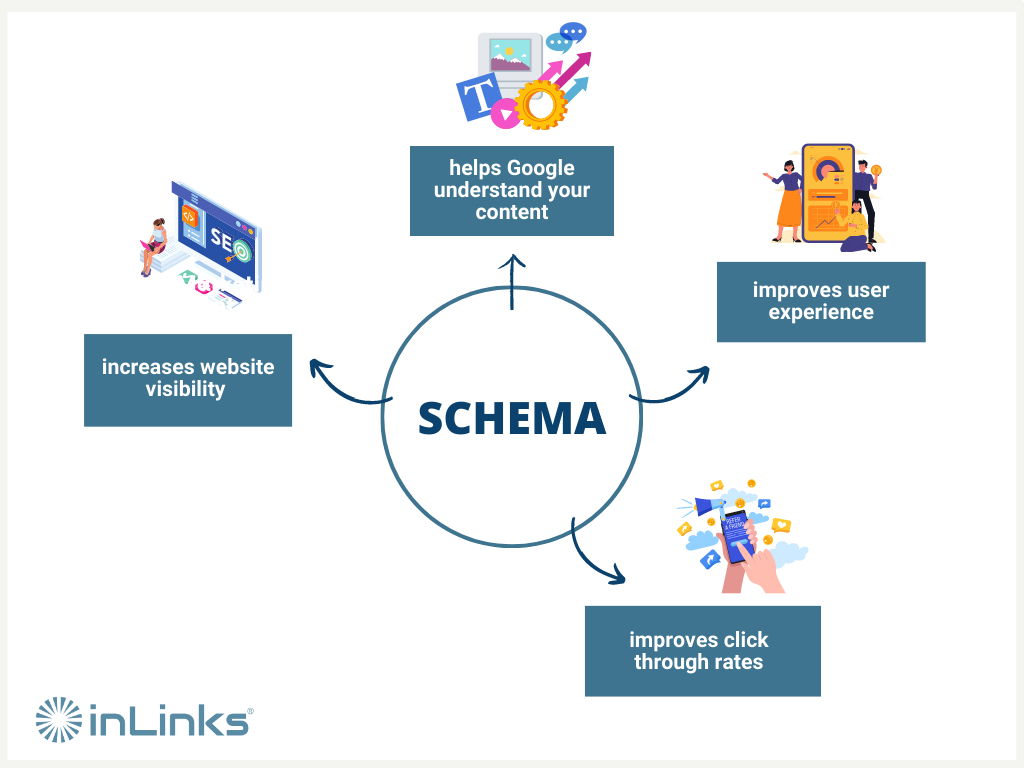Imagine if you could boost your website’s visibility with just a few tweaks. That’s exactly what schema markup can do for you.
It’s like giving your website a secret weapon to stand out in search engine results. You’ve probably noticed those rich snippets with star ratings or event dates when you search online. That’s schema markup in action, and it can transform how people see your site.
Why settle for blending in when you can shine? By understanding and implementing schema markup, you can make your website more appealing to both search engines and users. It’s a simple way to provide search engines with better information about your content, which can lead to higher rankings and more clicks. Are you ready to learn how schema markup can elevate your SEO game and attract more visitors to your site? Let’s dive in and explore the power of this tool.
What Is Schema Markup
Schema markup is a powerful tool for enhancing website SEO. It provides search engines with detailed information about your site content. This helps them understand and display your content better. But what exactly is schema markup?
What Is Schema Markup?
Schema markup is a form of microdata. It creates enhanced descriptions, or rich snippets. These appear in search results. Schema markup helps search engines understand your content. It adds context and meaning to your data.
Search engines like Google, Bing, and Yahoo use schema markup. It helps them deliver more informative results to users. With schema markup, your website stands out in search results. This can lead to higher click-through rates.
How Does Schema Markup Work?
Schema markup works by embedding structured data in your web pages. It uses a specific vocabulary, known as schema.org. This vocabulary is recognized by major search engines. The markup describes elements on a webpage. For example, it can define a product, an event, or a review.
By adding schema markup, you provide search engines with additional information. This helps them display your content in a more attractive way. For instance, they might show ratings, prices, or availability directly in search results.
Benefits Of Using Schema Markup
Schema markup improves visibility in search engine results pages (SERPs). It makes your web pages more interactive and engaging. Users can find relevant information quickly. This can improve user experience and drive traffic to your site.
Rich snippets, created by schema markup, are more appealing. They provide users with more context about your content. This can enhance your site’s authority and credibility. Search engines may also rank your pages higher due to improved clarity.

Credit: digitalguider.com
Types Of Schema Markup
Schema markup boosts website SEO by making content more visible. Different types of schema markup cater to different needs, enhancing search results. Adding specific schema types can improve visibility and user engagement. Let’s explore four common types of schema markup.
Product Schema
Product schema provides details about a product. It includes price, availability, and reviews. Search engines display this information in search results. Users can see product details directly on the search page. This enhances user experience and can lead to more sales.
Event Schema
Event schema highlights upcoming events. It includes dates, locations, and ticket details. Search engines display events directly in search results. This helps users find events easily and increases attendance. Users can quickly know event information without visiting multiple pages.
Local Business Schema
Local business schema boosts local search visibility. It includes address, opening hours, and contact details. This information appears in search results, helping local customers find businesses. Users can contact businesses directly from search results. This improves local engagement and foot traffic.
Review Schema
Review schema showcases customer reviews. It includes star ratings and comments. Search engines display reviews in search results. Positive reviews attract more visitors and build trust. Users can see ratings before visiting a website. This can influence purchasing decisions and improve credibility.
Benefits For Seo
Schema markup boosts website SEO by enhancing search engine understanding of content. It increases visibility with rich snippets, improving click-through rates. Enhanced data helps search engines deliver accurate results, fostering better user engagement.
Adding schema markup to your website can significantly enhance your SEO efforts. It offers a structured way to provide search engines with more detail about your content. This additional detail can lead to higher search rankings and better user engagement. Let’s dive into how schema markup can benefit your SEO.Enhanced Search Visibility
Schema markup can make your website stand out in search results. It helps search engines understand the content of your pages better. When search engines know what your content is about, they can show it to the right audience. This means more people will see your website when they search for related topics. Imagine searching for a recipe and finding a result with a star rating, cooking time, and a thumbnail image. This is schema markup at work, making that link more attractive to click. Your website can achieve similar visibility, reaching more users who are interested in your content.Improved Click-through Rates
Schema markup can also boost your website’s click-through rates (CTR). When your search results are more informative and appealing, users are more likely to click on them. This means more traffic to your website, which can lead to more conversions or sales. Have you ever been drawn to a search result because it had extra information? Maybe a review score or a product price caught your eye. That’s the power of schema markup. By making your search results more enticing, you can drive more visitors to your site.Rich Snippets Impact
Rich snippets are the extra bits of information shown on search results, thanks to schema markup. They can include things like ratings, prices, or event dates. These snippets not only make your listing more appealing but also more informative. A few years back, I noticed a significant increase in traffic after implementing schema markup for a client’s e-commerce site. The rich snippets displayed product prices and availability, which attracted more clicks. This proves that rich snippets can have a direct impact on your website’s success. Are you using schema markup on your website? If not, you could be missing out on valuable traffic and engagement. Consider adding it to your SEO strategy to reap these benefits and improve your online presence.
Credit: inlinks.com
Implementing Schema Markup
Schema markup boosts website SEO by helping search engines understand content better. It enhances visibility in search results, leading to increased click-through rates. By providing structured data, it improves the way your site appears in search results.
Implementing Schema Markup is a crucial step in boosting your website’s SEO. This powerful tool helps search engines understand your content better, presenting it in a way that can enhance your visibility and attract more visitors. By using Schema Markup, you can make your website more attractive to search engines, leading to higher rankings and more clicks.Using Json-ld
JSON-LD is a popular format for adding Schema Markup. It stands for JavaScript Object Notation for Linked Data. This format is easy to use and integrates seamlessly into your HTML code without altering the existing structure. Using JSON-LD simplifies the process of marking up your data. You add a script tag in the head section of your HTML document. This script contains all the necessary markup data. This separation of markup from content makes JSON-LD cleaner and more manageable. It’s a preferred method by Google, ensuring your website is read accurately by search engines.Tools For Implementation
There are various tools available that can help you add Schema Markup to your site. Google’s Structured Data Markup Helper is a useful resource for beginners. It guides you through the process step-by-step. Another option is Schema.org, which provides a wide range of schemas. This resource helps you find the right markup for your content type. Plugins for popular CMS platforms, like WordPress, can automate the process. They make it easy to implement Schema Markup without needing extensive coding knowledge.Testing And Validation
Testing and validating your Schema Markup is vital. It ensures that the markup is correctly implemented and recognized by search engines. Google’s Rich Results Test is an excellent tool for this purpose. It helps you identify any issues with your markup and provides suggestions for improvement. Regularly checking your Schema Markup can prevent potential SEO problems. This practice ensures your website maintains its visibility and continues to attract traffic. By making these adjustments, you can optimize your site’s performance. Have you tried implementing Schema Markup on your site? What tools have you found most helpful?Common Mistakes To Avoid
Schema markup enhances website SEO by organizing data for search engines. A common mistake is neglecting to update schema, causing outdated information. Ensure schema types are correctly used to avoid confusion and improve search engine visibility.
When it comes to optimizing your website for SEO, schema markup can be a powerful tool. But, like any tool, using it incorrectly can lead to more harm than good. Many website owners make common mistakes when implementing schema markup, which can prevent them from reaping its full benefits. Let’s dive into these mistakes and see how you can avoid them.Incorrect Data Types
One frequent error is using incorrect data types for schema markup. Each piece of information on your website has a specific data type. Using the wrong one can confuse search engines and impact your SEO. Imagine marking a product as a “Person” type. This mismatch can lead to irrelevant search results and lost traffic. Always double-check that the data types you use align with the content you are marking up. Check tools like Google’s Structured Data Testing Tool to ensure everything is correct. It’s a small step, but it can make a significant difference.Overuse Of Markup
More is not always better. Overusing schema markup can clutter your code and confuse search engines. Not all information on your page needs markup. Think of it like dressing for an event. You wouldn’t wear a tuxedo to a beach party. Similarly, unnecessary markup can make your site appear over-optimized. Focus on key elements that enhance user experience and provide value. Prioritize essential data that helps search engines understand your content.Ignoring Updates
Schema.org and search engines frequently update their guidelines. Ignoring these updates can leave you behind, impacting your SEO efforts. Consider the time when Google added new types for COVID-19 announcements. Websites that didn’t update their markup missed out on being featured in relevant searches. Stay informed by subscribing to updates from Schema.org or SEO blogs. Regularly reviewing your markup ensures you’re always aligned with current best practices. By avoiding these common mistakes, you can harness the full potential of schema markup. How are you planning to refine your schema strategy?Case Studies
Schema markup boosts SEO by helping search engines understand website content better. It enhances visibility in search results, leading to higher click-through rates. Implementing schema can improve site ranking and attract more visitors.
Schema markup can be the secret weapon in your SEO arsenal. But how can you be sure it really makes a difference? Case studies can provide proof by showcasing real-world examples of how schema markup transforms websites. These stories, lessons, and successes offer you tangible insights into the power of structured data.Success Stories
Consider the story of a local bakery that added schema markup to their site. Within weeks, their search visibility soared. The bakery’s online traffic doubled, and they saw a noticeable increase in orders. This wasn’t just about better ranking; it was about engaging directly with potential customers who found them more easily. Then there’s the tale of a tech blog that struggled with low engagement rates. After implementing schema markup for their articles, they noticed a 30% boost in organic clicks. Readers were drawn to rich snippets, providing a glimpse of content before visiting the site. These examples prove schema markup isn’t just a technical trick; it’s a practical tool. Have you considered how it might change your site’s story?Lessons Learned
Schema markup isn’t a one-size-fits-all solution. Some businesses found they needed to tweak their strategy. A travel agency learned this the hard way. Initially, they applied broad schema types, which caused irrelevant search results. They refined their markup to focus on specific tours and destinations, and suddenly, qualified leads increased. This showed them that precision matters. Schema markup must be tailored to your content and audience. Another key lesson: consistency is crucial. One e-commerce site saw fluctuating results when they sporadically updated their schema. Steady, consistent updates kept their product listings relevant and visible. These lessons highlight the importance of deliberate, strategic application. Are you ready to apply schema markup thoughtfully? — Schema markup can be transformative, but like any tool, it requires understanding and precision. By learning from others’ experiences, you can leverage schema markup effectively and maximize your site’s SEO potential.Future Of Schema Markup
Schema markup is not just a technical tool; it’s a game-changer for your website’s SEO. As search engines evolve, so does the importance of structured data. But what does the future hold for schema markup, and how can you leverage it for your site?
Imagine a world where your website content is not only easily found but also perfectly matched to user needs. That’s what schema markup aims to achieve. It’s not just about being visible; it’s about being relevant.
Let’s dive into the emerging trends and the impact on voice search to see how schema markup is shaping the future of SEO.
Emerging Trends
Schema markup is continuously evolving, with new types being introduced to cover more specific data. This means more opportunities for your website to stand out in search results.
Consider schema types for video content or product specifications. These can enhance the visibility of your content, making it more appealing to users and search engines alike.
As search engines get smarter, they rely more on structured data to understand content context. Are you ready to adapt to these changes? Implementing new schema types can be your competitive edge.
Impact On Voice Search
Voice search is transforming the way users interact with search engines. Schema markup plays a crucial role in optimizing your site for voice search.
With voice search, users expect quick, accurate answers. Schema markup helps search engines deliver your content as concise, relevant responses.
Imagine asking a voice assistant a question and having your website provide the perfect answer. That’s the power of schema markup. Are you optimizing your site to meet the demands of voice-driven searches?
In the future, schema markup will be pivotal in tailoring content for voice search. Start integrating it now to ensure your site stays ahead of the curve.

Credit: dcpweb.co.uk
Frequently Asked Questions
What Is Schema Markup In Seo?
Schema markup is a code added to your website to help search engines understand content better. It enhances search visibility by providing more detailed information about your page. This can result in rich snippets that improve click-through rates and user engagement.
How Does Schema Markup Improve Website Seo?
Schema markup improves SEO by making your website more understandable to search engines. This can lead to rich snippets, which enhance search result visibility. Rich snippets can increase click-through rates, boosting overall site traffic and engagement, which positively impacts SEO.
Is Schema Markup Essential For Seo Success?
While not mandatory, schema markup significantly enhances SEO efforts. It provides detailed content descriptions, leading to rich snippets in search results. These snippets increase visibility and click-through rates, contributing to better site traffic and search rankings.
Can Schema Markup Affect Search Rankings?
Schema markup doesn’t directly affect rankings but improves search result appearance. Enhanced visibility through rich snippets can increase click-through rates. Higher click-through rates can indirectly boost rankings by improving site traffic and engagement metrics.
Conclusion
Schema markup boosts your website’s SEO effectively. It helps search engines understand your content better. This leads to improved visibility in search results. Users find your site more easily. Increased traffic follows. Rich snippets attract more clicks. Better engagement results from clearer information.
Schema markup is simple to implement. Tools and plugins make it easier. Regular updates keep your site optimized. Invest time in learning schema markup. The benefits are worth the effort. Start today and enhance your site’s presence. Your website will gain an edge.
Stay ahead in the competitive digital landscape.
